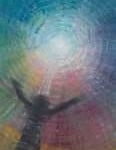Moshe Kempinski
We are approaching the days of awe and repentance. It is in fact a time of great judgment and introspection for all the nations of the world. During this time in history , it is also a period wherein the whole world is engulfed in a time of great uncertainty and upheaval. The United States is locked in a bitter and rancorous struggle for leadership. Other nations are embroiled in bloodshed and strife. In Europe ,cultures and traditions are being washed away by a tidal wave of immigration and population changes. In Israel we are facing growing interior debate about how we are to deal with life and death threats on the one side and growing alienation from our “friends ” on the other.
It then becomes very sobering to read the ninety eight curses in this weeks Torah portion .G-d declares that these curses will come upon His people ;
“… if you do not obey HaShem, your G-d, to observe to fulfill all His commandments and statutes which I am commanding you this day, that all these curses will come upon you and overtake you.( Deuteronomy 28:15)
Then HaShem declares reveals the deeper source of those curses ; “All this is because you did not serve G-d, your G-d out of joy and with gladness of heart while you possessed good things. (ibid 28:47).
What does “joy and with gladness of heart” have to do with all this?
Joy is also the feature in the beginning of the Torah portion which begins with the Hebrew word “VeHaya”;
And it will be,( Ve Haya) when you come into the land which HaShem, your G-d, gives you for an inheritance, and you possess it and settle in it,( ibid 26:1) .
We are told by the Midrash Rabba that the Hebrew word for ‘and it will be’ , VeHaya is a code word for joyful expectation. ”Rabbi Shmuel Bar Nachman came and declared, ‘In any place where it says “And it was (VaYehi ) “ it signals distress; and when it says “And it shall be (VeHaya) ” it signals rejoicing.’”
Rav Zvi Yehudah Kook z”tl explains this statement and says that when the letter “Vav” (which means ‘and”) is placed before a verb that is in the past tense, it transforms the verb into the future tense ( and vice versa as well). The word VeHaya is made up of the verb “haya” which is in the past tense .The Hebrew letter vav at the beginning of the word transforms it into the future tense ( and it shall be).The same occurs with the verb “ Yehi” which translates as ‘It will be’ to ‘and it was’.
Rav Tzvi Yehudah goes on to explain that our past and our future are intricately connected. Yet the way that connection is made, greatly affects our present sense of being. There are those who are imprisoned by the difficult journey of the past and have taken their vision of destiny and have diminished it. They have taken the future and have cast it into the past. That is the sadness of “VaYehi”.
On the other hand, there are others who have looked back on their difficult journey and have overcome its despair and pain and have harnessed it into the future. They have taken their past and have retransformed it in light of their future sense of destiny. That is the joy expressed by the word “VeHaya.”
Based on how we live and look at our life will in fact impact, influence the choices we make in our life. It will also deeply influence the way we look at our lives.
Therefore the curses that are mentioned in our portion are not punishments or irrevocable predictions, but they are the state of being resulting from our decisions. In the words of Rambam, “Even though you served G-d, you did not serve him with joy and that is the source of all afflictions. ”
In essence then, the secret of serving Hashem with Joy and of turning our individual and corporate lives from curses to Joy is the art of learning how to “connect the dots”. We need to look at Jewish history and where we have come from and what we have experienced and then look at how far we have come on the road of destiny. That essentially is the subtext of the farmer’s declaration when he brings his first fruits ( ibid 26:3-11).
Those connections will be necessary in surviving today’s tumultuous times as well. It is only with this perspective that we can then hear and be reassured by the promise declared by Isaiah in this week’s haftara;
” Arise, shine, for your light has come, and the glory of HaShem has shone upon you.For behold, darkness shall cover the earth, and a gross darkness the kingdoms, and Hashem shall shine upon you, and His glory shall appear over you. And nations shall go by your light and kings by the brilliance of your shine. Lift up your eyes all around and see, they all have gathered, they have come to you; your sons shall come from afar, and your daughters shall be raised on [their] side.( isaiah 60:1-4)

